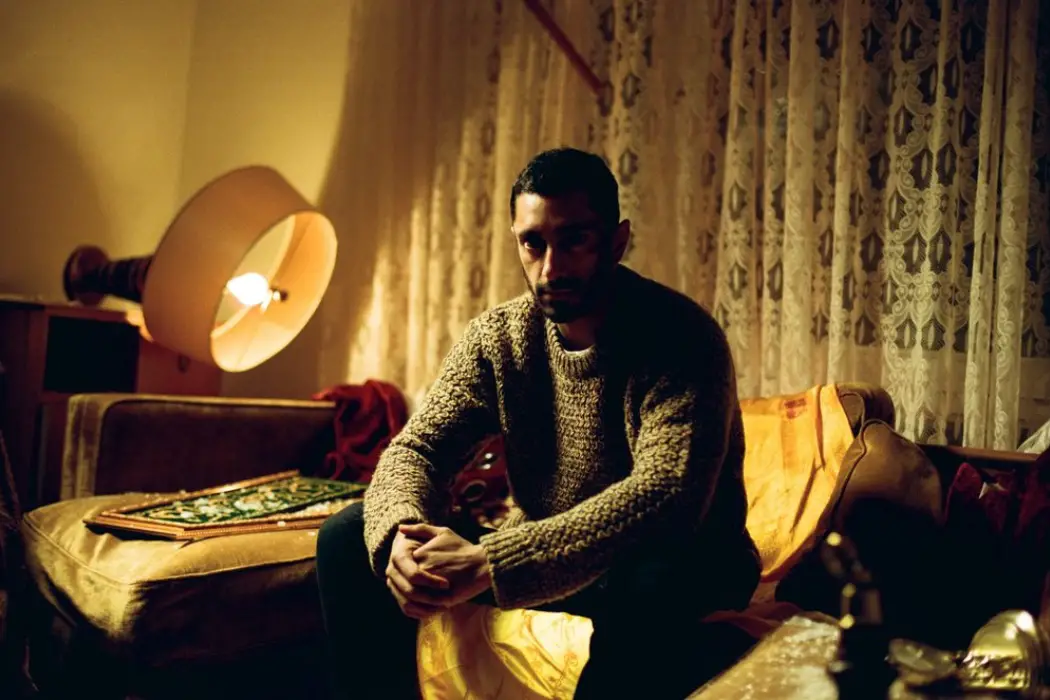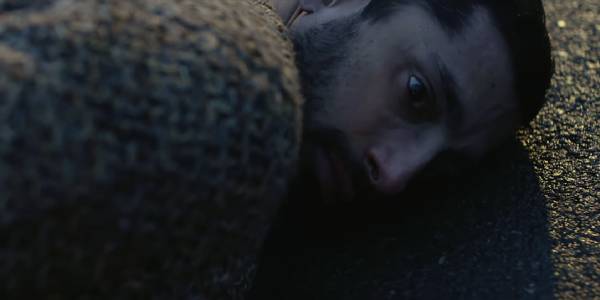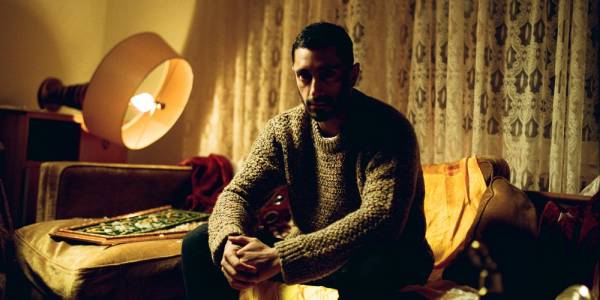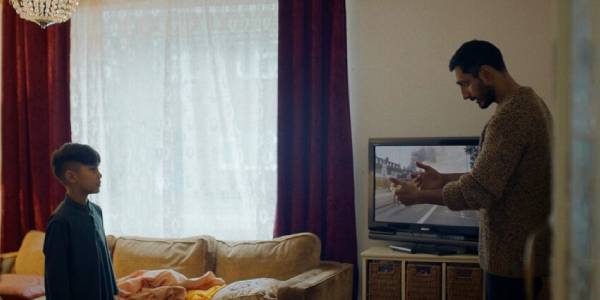“It Feels Like We Live In A Country Which Every Day Adopts A Colder, More Troubling Stance Towards Immigration.” Interview With Aneil Karia, Director of THE LONG GOODBYE

Former film student from Scotland turned writer and film reviewer.
On the brink of a mysterious virus sweeping its way through the globe back in 2020, Aneil Karia and Riz Ahmed revealed their first project together, a short film called The Long Goodbye, written for Ahmed‘s record of the same name. It explored themes of immigration, family, and authoritarianism in its brutal unfolding as a British-Asian family gather for a wedding and are summarily rounded up by masked forces who invade their home. Its depiction of Britain is at once boldly dystopian but also sadly familiar and is bookended by an incredible monologue from Ahmed railing against the society which shuns people of his colour – “now everybody everywhere wants their country back” he fumes, staring directly into the camera, fire in his eyes, “if you want me back to where I’m from then I need a map”.
Now, almost two years later, The Long Goodbye has picked up festival awards from both Raindance and Cannes, and qualifies for Oscar nominations. I sat down with Aneil Karia one cold Monday morning at 9:30 am to discuss this, coffee in hand. Karia had just dropped his children off at nursery. He is engaging and humble when speaking about his career, but there is a seriousness to him when he speaks of his country and the problems it faces. Our conversation ranges from the Oscars to the British state, to his latest film Surge, and proves to be both insightful and enlightening.
Daryl MacDonald For Film Inquiry: So I understand The Long Goodbye is in contention for the Oscars, is that right? I’m not sure how the process works.
Aneil Karia: [laughs] It’s a bit confusing, the language that gets used. Basically, there’s a very finite number of festival prizes which you can win that will qualify you to enter the Oscars short film category. There’s about 60 festivals worldwide and there’s two or three prizes – animation, live action – at each festival that can qualify you for the Oscars. It’s all quite confusing. But The Long Goodbye has had a really good run of festivals and awards, and its won two of those so it’s now eligible to enter the Oscars. Whether it’s longlisted or shortlisted is a complete unknown, but now we qualify for it there’s a bit of momentum.
So are you feeling the buzz now you’ve qualified?
Aneil Karia: Yeah, I mean it’s all new to me but it does feel exciting. We have no idea whether it will happen – there’s a lot of films that are eligible and there’s a shortlist of five – so there’s still a long road, but it feels exciting, the idea of getting a story like this, such a British one with such specificity and such a strong message, onto a platform with that kind of enormity.
Does it feel important to reach a wider audience with the message of The Long Goodbye? It’s a very British story, but Oscar nominations will open it up to an American audience, possibly for the first time.
Aneil Karia: Exactly, yeah. That is exciting to us. We didn’t go into it with an overtly issue-based message. The message wasn’t the only point, it was an act of filmmaking as well, and it was a personal project. It was doing something that we ourselves wanted to explore for ourselves. The first thing we hoped is that we executed it so that the themes were being explored in a way that was nuanced and interesting and emotionally potent. It was quite a scary idea to execute well. It’s a very heightened concept, something moving from that naturalistic portrait of a family to something really troubling and intense. So I was very aware that there are probably several ways to execute that really badly. [laughs]
The first thing I was concerned with was just pulling it off, you know? This huge idea through a very small lens. To look at something really unsettling and to examine where this shifting political spectrum we’re on could eventually land if we’re not careful, to look at something quite global through the lens of one ostensibly totally normal British-Asian family.
In the edit, you spend so much time with it, and you get so intricate with it, pulling it apart and putting it back together, that by the end you tend to be a bit snow-blind. You think it works, but you have no objective concept of how it’ll be received or whether it’s objectively good or hard-hitting. So we got to a place where we thought it was good but we just had to let it live. It was only when we started seeing the reactions, particularly from the South-Asian community in Britain that we knew it had really landed somewhere emotionally.

Anyway, I’ve sort of rambled! But I think hopefully what [the film] does do well is deal with a difficult and challenging concept, which is that even though an ethnic minority in the western world being rounded up and killed feels like a heighted, dystopian, fictional idea, it isn’t so hard to imagine it playing out on the suburban streets of Britain. Even though it feels heightened in one sense, in another sense it’s a real, tangible fear that lives inside the minds of so many minorities. With the kind of political rhetoric we’ve been experiencing in the past decade, the growth of populism, and the normalising of what used to be relatively far-right language, it’s a slippery slope and you never know how many steps away you are from something that dark, you know?
No Man’s Land
I want to come back to this topic because it’s so important, but first I’m curious about how this project came about. It was devised as a concept for Riz Ahmed’s record of the same name, right?
Aneil Karia: That’s right, yeah. That was definitely the creative springboard for it. Riz was releasing this album and we’d only very recently met for the first time. A mutual friend of ours, Yann Demange (director of ’71), introduced us. I’d made a short-film also inspired by an album with (British rapper) Kano. Maybe a year before The Long Goodbye, Kano came to me and said he wanted to make something that lived outside the traditional music genre, but still featured tracks from his forthcoming album. Together we conceived this short film which had musical elements but was still a narrative short film.
Anyway, Riz had responded really well to that film and wanted to speak about doing a short film himself, so he sent me a link to his album, and I was immediately onboard because I thought it was such an amazing piece of music; the concept and the lyrics really moved me. So I started scribbling down some rough ideas, sort of back-of-fag-packet style, and we met up and talked for a long time, threw it around together, talked about what might be interesting. Riz has this amazing creative mind that goes way faster than mine! The way we approached it – the way I approach a lot of filmmaking – is I ended up writing a beat sheet which had a clear structure of what was happening: it had pretty well-defined parameters of each scene and what was going on, but in terms of the nuances and the exact geography and blocking, the idea was for this film to be semi-improvised to try and lend it that naturalism that I really wanted.
One of the key things about the approach was [although it’s] a dystopian, high-concept idea, we wanted it to feel totally ingrained in the real world just so we could hit home how possible it could be. So naturalism was really important, and I felt the semi-improvised approach would be good for that.
That naturalism feels like your signature style. It’s very prominent in Surge, which I’ll come back to later, but I was reading an interview with Riz where he said The Long Goodbye was a very personal project for him, and I’m wondering – coming from a similar background as Riz – if it was the same for you?
Aneil Karia: Yeah, to an extent. Riz comes from a Pakistani family, and my dad’s heritage is Indian. Riz grew up in a Muslim faith and for me it was Hindu, so there are geographical and religious differences. The Long Goodbye is about a Muslim family, and I think Islamophobia is so much more of a raw problem than any specific racism towards Hindus in this country, although actually, the two faiths share so many cultural rituals and traditions, massively so with weddings, there’s so many rituals you see [in the film] like with the mehndi that are so consistent among both faiths.
Broadly speaking, the larger feeling that inspired [the film] is universal to any minority in this country. You’re living in a place which increasingly feels like it doesn’t want you, as you watch populism grow, and then Brexit happens and all the rhetoric surrounding that, and you start to feel like the country you were born in, the only country you know, seems to actively dislike you.
So the overriding point and emotion that was propelling this story forward was universal to both of us and lots of different people involved. In fact the cast are a mix of Indian and Pakistani. So I think the bigger point was something that we both understood very well.
It sounds like a really tough way to grow up.
I found it really troubling. As a young adult you start becoming more and more conscious, and the more basic ideas that you grew up with as a child and adolescent fall away and you start to understand the reality behind things. It’s been strange to go through that process in the 21st century as politics become so crude and lacking in compassion and openly racist to an extent. Riz talks really eloquently about this No Man’s Land; you’re British-Asian and the UK is the only country you’ve ever lived in, but it doesn’t feel like your own, it doesn’t feel like you’re allowed to own it, to cement your identity in it. Likewise, India does not provide the foundations of my cultural identity either. I’ve visited there and I really like it but it’s not somewhere I intimately know, it’s not my place, you know?

So Riz talks about this No Man’s Land, and that it can be quite confusing and discombobulating and when we sat down to talk, that hugely struck a chord with me. I think it’s quite inspiring what he’s talking about, because he’s talking about no longer being afraid of that No Man’s Land, he’s talking about occupying it as a tangible nation, which is such a wonderful idea. That felt so personal to me.
Surge
The Long Goodbye was released back in March 2020, is that right?
Aneil Karia: [laughs] Yeah, that’s right. In fact, I remember having a screening and everyone was talking about [Covid] but no-one understood that it was ripping its way through the UK already! Some people weren’t shaking hands, that kind of thing. It’s funny because it’s so absurd to think we were all in this tiny space together thinking if we don’t shake hands we’ll be okay!
So it’s been almost two years now since The Long Goodbye was made. How do you feel the political landscape of the UK has changed in that time?
Aneil Karia: Sadly I’m not sure it has changed, particularly. I mean, it terms of how indifferent and even kind of cold the government are towards these themes I don’t think it’s changed at all, in fact I think it seems to have intensified. It’s weird to think about how Covid has exacerbated the direction of populism. It’s hard to tangibly quantify, but all I know is it feels like we live in a country which every day adopts a colder, more troubling stance towards immigration and anything to do with creating a truly safe and cohesive world for all of us, no matter who we are. I feel like [the government] is actively disinterested in that.
This other strange thing has happened, which is the decaying relationship between government and truth/accountability. A very, very small, hopeful part of me is wondering if people are tiring of that, but it’s really hard to know.
Yeah, that maybe there’s a new type of politics on the horizon…
Aneil Karia: Yeah, I just don’t think it’s gonna be new enough. I think we’re existing in this very narrow sphere in the political spectrum and whoever comes into power just dances around this tiny surface of politics rather than thinking about what far away possibilities there are, but I think that’s maybe too challenging for people to think about right now.
I really wanted to ask you about Surge, because I covered it at the Glasgow Film Festival last year and I loved it. It reminded me of the Safdie brothers’ work in the sense that it’s very raw and visceral, very immediate, which could also be said about The Long Goodbye. Is that something you’re drawn to as a filmmaker?
Aneil Karia: Yeah, I think so. I think I instinctively lean towards that sort of thing. I’m probably more concerned with feeling and am perhaps more competent at creating feeling than I am when it comes to plot, which is why I’ll often collaborate quite closely with other writers. Ever since I was a teenager I felt like I’ve had this sort of acute emotional sensitivity to moods and places, things like that, and part of what inspired Surge was that when I moved to London it had such a fascinating energy to it, which seemed to shift and warp and have a life of its own. It had a sort of living nature, with mood swings, and I felt attuned to that.
And there’s a two way relationship to that: the mood of the city both influences us and our mindset, but also the 8 million people with their moods shifting, create that macro-London energy, so there’s an interesting relationship there and I like the idea of trying to harness it.

It’s interesting that you mentioned the Safdie brothers because I think historically New York is somewhere that filmmakers have captured really, really well. I think there’s a whole genre of movie which is “New York”, which I love, and I think people have very successfully captured that energy. With London I feel there’s often these safe, generic, stock versions that we slip into in film. I mean there’s exceptions obviously, films like Naked (1993 Mike Leigh film starring a young David Thewlis), but often you’ll see these slightly well worn stock versions of London that I never fully recognise, so a lot of the compulsion I had to make Surge was to try and harness that real London energy that I had felt so acutely, and was so fascinated by when I moved to London.
I wanted to make something that was very present and go on a journey through the city, with all that shifting energy. I think the kind of filmmaking I do is sort of a living, breathing animal that exists in the now. Particularly with Joseph in Surge, he goes on a mad emotional ride. In one sense there is something quite damaging happening to him, then in a more spiritual or emotional sense there is this surge, this liberation. So there’s this complicated dual thing going on, and I wanted to live that with him, for us to feel what he’s feeling, whether it’s anxiety or joy.
What’s interesting about Surge is you get such different reactions to that film. Some people find it just relentlessly dark, and then some people find catharsis in it, so I think it’s one of those films that inspires quite radically different reactions, which is cool.
You mentioned earlier that The Long Goodbye was semi-improvisational. Was that the case with Surge? It felt like such a natural performance from Ben Wishaw and I’m wondering how much direction you gave him.
Aneil Karia: With Surge it was a bit different. We did something quite specific, which was that the dialogue was scripted – and we worked on the film with the writers for many years – but physically I wanted to allow a lot of freedom for Ben, so most scenes were completely unblocked. Particularly on the street Ben would have complete autonomy on where he went and how he got there. So there was a huge element of improvisation, yeah, but it was a very physical element. He would start here and have to end up at the bank, but how he got there, the route he took, and the energy with which he got there was totally in his control and we would be responsive to that.
Feature Length
So you did Top Boy, Lovesick, and a few short movies, but Surge was your first feature length movie, right?
Aneil Karia: Yeah, that’s right.
What was it like moving to a feature length movie? Were there differences you didn’t anticipate?
Aneil Karia: It was quite liberating actually. I found it a real thrill because we’d sat in rooms talking about this movie, conceptually, for a long, long time and in that time Ben became a friend, so I was making it with people I loved and making it in the city I loved, in summer. It was a privilege to be making this film. Also, I’d come off the back of doing TV, which I also loved doing, but in TV you’re invariably not involved in the creation and the writing of those shows, so you’re coming in and trying to do the best service you can to those brilliant scripts. Surge was a lot more of a personal project, even though there were other writers. And with film people want the director to do their thing and make it theirs, whereas with TV there’s a bit more of a balancing act.
So it was very freeing in that sense and the first long form project where I could just follow my instincts and make it exactly how I wanted to. It was summer, in London, we had an amazing crew and amazing cast. It was probably the most pre-Covid memory I’ll ever have [laughs], because there’s nothing locked down about Surge. It is a sprawling, heady, close human experience, and I think it will always live in my mind, this thing that we made just before Covid happened, and it’s how I remember London before it: a heaving, sweating, totally un-distanced living being! And I think maybe it’s working its way back to that, but it’ll never quite be that again.
Okay, final question and then I’ll let you go! Do you have any new projects coming up on the horizon you can tell us about?
Aneil Karia: Well…I’m working on a feature film with Riz, which I can’t really talk about right now. But we’re hoping to make that towards the end of next year. I’m also about to start a TV project in January.
Excellent! So you’re keeping busy?
Aneil Karia: Yeah, I mean it’s been a funny couple of years – a lot of development stuff, a lot of meetings and a lot of parenting! It’s been good, but now I’m really quite hungry to get stuck into some stuff!
Film Inquiry would like to thank Aneil Karia for taking the time to speak with us!
You can watch Aneil Karia’s award winning short film The Long Goodbye on YouTube.
Does content like this matter to you?
Become a Member and support film journalism. Unlock access to all of Film Inquiry`s great articles. Join a community of like-minded readers who are passionate about cinema - get access to our private members Network, give back to independent filmmakers, and more.













